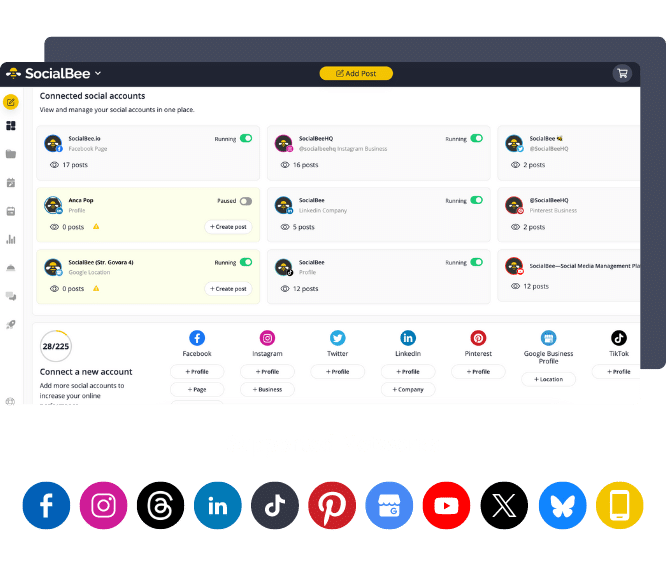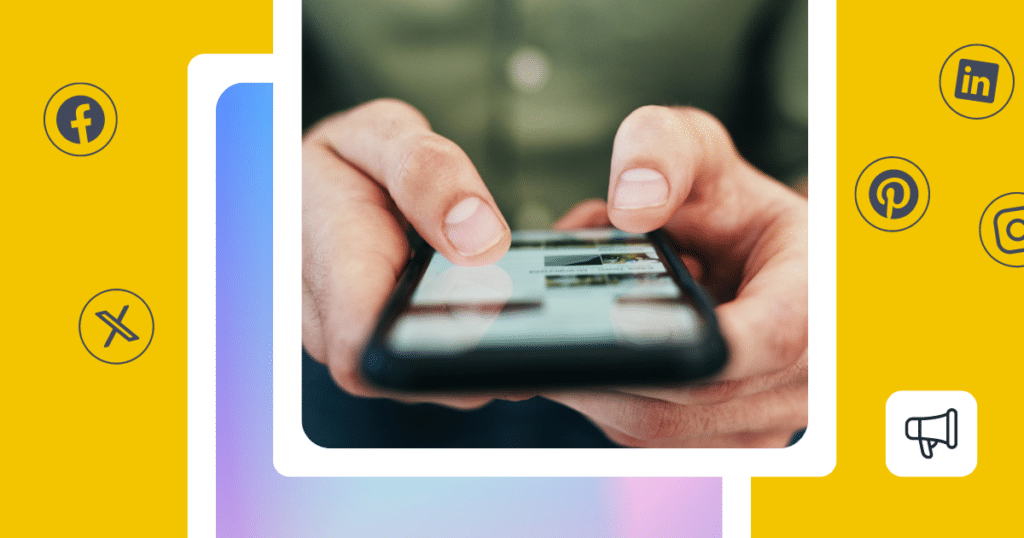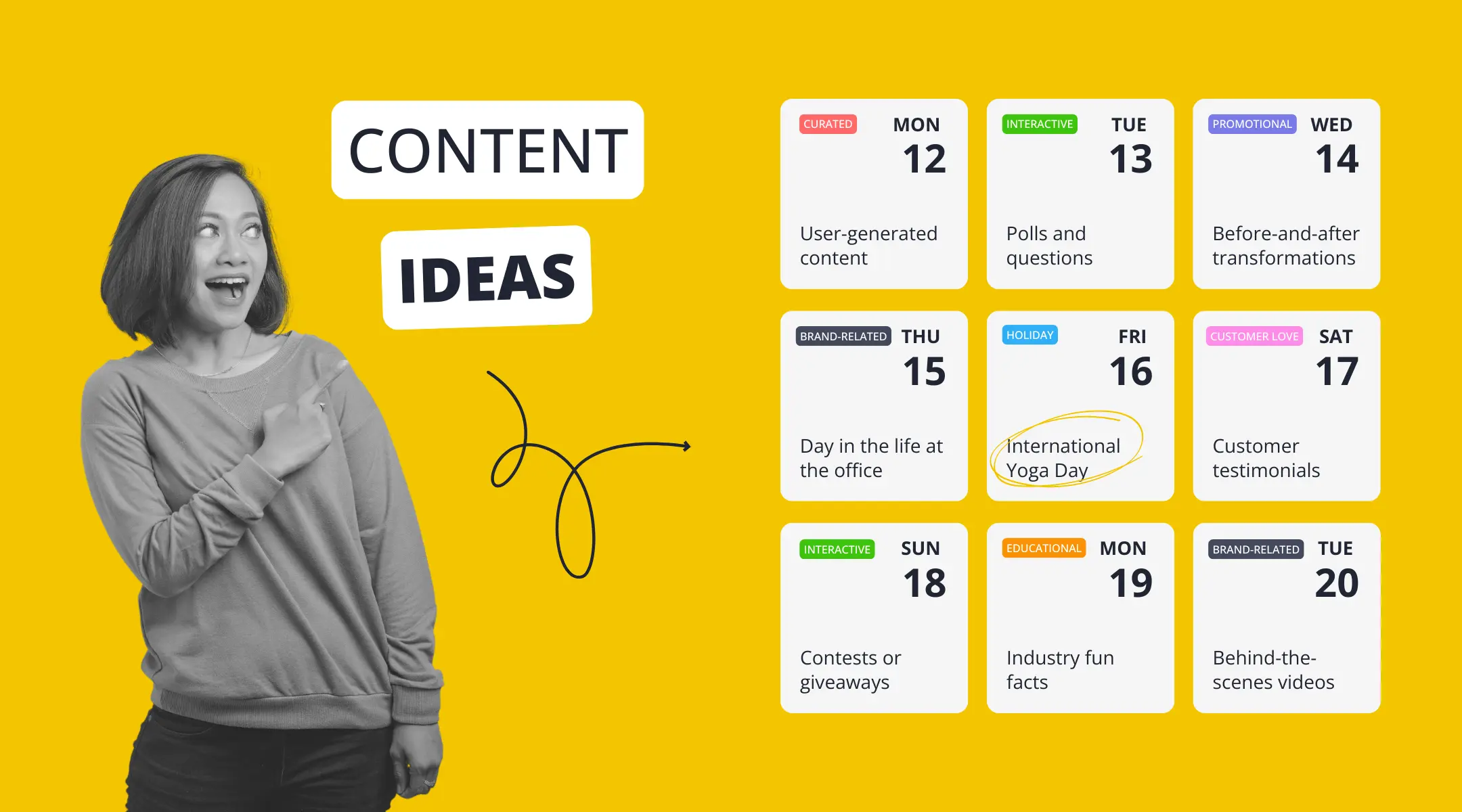
Guest Author
Over the past two decades, the rapid growth of social networks across the globe has led to digital marketing breaking off into various complementary types and strategies, such as influencer marketing campaigns.
Nowadays, influencers are more powerful and prominent than ever, especially with the rise of micro-influencers and accounts that boast smaller but devoted followings. All of this is to say that you have a golden opportunity to take your business forward by leveraging brand partnerships with influencers—but you have to do it right.
Working with influencers can be a goldmine as much as it can be a money pit if you’re not strategic about it. So, here are the most important tips for influencer marketing campaigns and examples that you should use for your strategy in 2024 and beyond.
Streamline your marketing with an efficient social media strategy template.

Short Summary
- A great influencer marketing campaign is crucial due to its ability to build trust, enhance credibility, and directly reach target audiences through a relatable and authentic content strategy.
- Establish specific objectives for your influencer campaigns, such as increasing brand awareness, driving website traffic, or improving sales. Utilize measurable metrics to evaluate the effectiveness of your campaigns and make data-driven adjustments for future strategies.
- Each brand needs different influencer marketing campaigns. Diversify your approach by experimenting with various content types like live events, interactive posts, and video content across different social media platforms.
- Stay flexible and responsive to new trends, audience behaviors, and platform changes to keep your campaigns relevant and effective. Ensure your content and influencer choices reflect inclusivity and diversity, resonating with a broader and more varied audience.
Table of Contents
- What Makes a Good Influencer Marketing Campaign?
- Tips to Create Successful Influencer Marketing Campaigns
- 1. Define the Most Relevant KPIs
- 2. Consider Different Types of Influencer Marketing Campaigns
- 3. Understand Different Types of Social Platforms
- 4. Capitalize on Influencer-Led Newsletters
- 5. Leverage Short and Long-Form Videos
- 6. Spread Word of Mouth for New Product Launches
- 7. Work with Micro-Influencers for Better Retention
- Frequently Asked Questions
- Ready to Craft Your Own Influencer Marketing Campaign?
What Makes a Good Influencer Marketing Campaign?
A successful influencer marketing campaign is characterized by these key elements:
- Clear goals and target audience: Know what you want to achieve and who you’re trying to reach.
- Right influencer fit: Choose influencers whose values, audience, and content style align with your brand.
- Authentic content: Content should be genuine and well-aligned with the influencer’s natural style.
- Strong collaboration: Effective communication and clear expectations between the brand and influencer are crucial.
- Measurable results: Use metrics to track performance and understand the return on investment for your business goals.
- Legal compliance: Ensure transparency and adherence to advertising regulations.
- Long-term relationships: Aim for ongoing long-term influencer partnerships rather than one-time promotions.
- Adaptability: Be ready to adjust to new trends and audience preferences.
- Diversity and inclusion: Make content accessible and relatable to a wide audience.
- Emotional connection: Influencers should create content that resonates and connects with their audience on a personal level.
Tips to Create Successful Influencer Marketing Campaigns
If you want to craft some of the best influencer marketing campaigns, we have put together a set of tips for you.
Here are some tricks on how to create successful influencer marketing campaigns:
- Define the most relevant KPIs
- Consider different types of influencer marketing campaigns
- Understand different types of social platforms
- Capitalize on influencer-led newsletters
- Leverage short and long-form videos
- Spread word of mouth for new product launches
- Work with micro-influencers for better retention
1. Define the Most Relevant KPIs
We can’t talk about a successful influencer marketing campaign if we don’t define some key performance indicators.
Always remember that a successful collaboration will rely on relevant data, and measurable performance that you can use to improve every subsequent campaign.
Most importantly, these KPIs will inform your entire SEO checklist and strategy to help you align all other marketing investments with your influencer campaigns.
Here are some social media metrics to keep track of:
- Reach on social media channels: Evaluate the extent of audience exposure on various social media platforms. Assess how many potential customers are viewing and interacting with the influencer’s posts and gauge the potential for reaching new audiences through each relevant influencer.
- Social media engagement rate: Monitor key engagement metrics such as likes, comments, shares, and clicks on the influencer’s social media accounts. Higher engagement rates are indicative of greater potential for conversions and effective audience interaction.
- Traffic to campaign-specific web pages: Create unique landing pages aligned with each influencer campaign to track the influx of new leads and conversions. This helps in measuring the direct impact of influencer efforts on website traffic.
- Conversion tracking: Keep an eye on sales metrics before, during, and after the influencer campaign. Analyzing these fluctuations helps in understanding the direct impact of the campaign on sales performance.
- Growth of social media profiles: Measure the increase in followers on your social media accounts as a result of collaborating with influencers. This growth is a tangible indicator of expanding brand visibility and audience engagement.
- Return on investment (ROI) for each influencer: Calculate the ROI for each influencer by setting specific goals such as sales, social profile growth, lead generation, or brand awareness. This evaluation helps in identifying the best influencers based on their contribution to achieving these goals.
Now that you understand the performance goals you should be tracking, you can delve deeper into the types of influencer campaigns.
2. Consider Different Types of Influencer Marketing Campaigns
Influencer marketing is a realm filled with wonder and potential, extending far beyond mere product showcases and brief mentions. It’s about crafting content that not only highlights your offerings but also delivers value and interactive engagement to a diverse audience.
When influencers create captivating and engaging content, it significantly boosts the likelihood of attracting followers and guiding them through your conversion funnel.
Some of the best influencer marketing campaign ideas include:
- Interactive quizzes
- Exciting contests
- Informative Q&As
- Dynamic live events
- Enticing giveaways
- Eye-catching product hauls
While the first five categories are quite straightforward, product hauls deserve a special mention. They’ve become a cornerstone of successful influencer partnerships, with numerous brands achieving viral status through these engaging showcases.
This diverse array of content types serves as a testament to the innovative and expansive nature of influencer marketing.
Gymshark is one of the best examples of influencer marketing collaborations in this space.

Gymshark has been nailing the influencer marketing game in recent years through perfect cross-profile tagging, regular promotions, and discount codes, and of course—influencer haul videos.
Gymshark Instagram influencers regularly get entire boxes of fresh fitness apparel to rate and review on their social channels and video platforms like YouTube and TikTok, where they can talk at length about all the great new stuff the company has put out.
This makes for engaging, high-converting content because they can also include personalized discount codes and powerful calls to action.
3. Understand Different Types of Social Platforms
When developing either a service-oriented or product-centric brand, whether in the B2B or B2C sector, it’s crucial to acknowledge that not every social media platform is the same.
Professional social networks, such as LinkedIn, target a business-focused, professional audience.
Utilizing influencers on LinkedIn effectively involves LinkedIn outreach. This strategy is about creating initial contact with potential clients. This outreach method is also useful for proposing collaborations to influencers.
In contrast, non-professional networks like Facebook, Instagram, and TikTok are more entertainment-oriented. Here, leveraging influencers is best for their content creation abilities and their influence, rather than for direct messaging.
These platforms are ideal for macro influencers, especially those in niches like fashion and travel, who can produce visually engaging content.
Understanding each platform is also beneficial for repurposing content effectively. With this knowledge, you can tailor your content to suit each platform’s unique audience and dynamics.
How to Optimize Influencer Marketing Across Multiple Platforms
Customizing your influencer marketing campaigns for each social media platform is essential to maximize engagement and ROI. Each platform caters to a different audience and has unique features that can be leveraged for more effective influencer marketing.
Plus, to drive more results out of each platform, your influencer campaign content needs to be:
- Tailored for each social network: Modify the content’s style, format, text length, image size, and use of hashtags to match each platform’s distinct user preferences and requirements.
- Scheduled at the best time: Post content when your target audience is most active on each platform, as this can significantly increase engagement and visibility.
- Monitored for performance: Regularly track and analyze the engagement metrics of your posts to understand what content performs best and make data-driven adjustments to your influencer marketing strategy.
PRO TIP: Leverage SocialBee for seamless social media management. It employs AI for post creation, allows channel-specific content customization from the same post editor, schedules posts at optimal times, and simplifies monitoring performance across all platforms. Manage all your social media campaigns from one single dashboard: SocialBee. |

Manage Your Influencer Campaigns with SocialBee!
Now, let’s have a more granular look at what practices you can apply on each social media channel to boost your influencer campaign results.
Facebook’s diverse demographic makes it ideal for broad-reaching campaigns.
Tips for running Facebook influencer campaigns:
- Use Facebook’s Custom Audiences to retarget people who have interacted with your influencer’s content.
- Partner with influencers for Facebook Live sessions, focusing on Q&As or product demonstrations.
- Create exclusive Facebook groups where influencers can engage more personally with your audience.
PRO TIP: Use SocialBee to post on Facebook profiles, pages, and groups from one place. Create, schedule, and monitor all your Facebook content without the hassle. |
TikTok
TikTok’s short-form video format is perfect for creating viral content. Embrace creativity and trends while maintaining your brand’s voice.
Tips for running TikTok influencer campaigns:
- Create branded hashtag challenges with influencers to drive user participation and content creation.
- Engage in TikTok’s Duet feature with influencers to create interactive and fun content.
- Showcase behind-the-scenes glimpses of your brand or product in collaboration with influencers.
Instagram is visually driven, making it perfect for lifestyle and aesthetic-focused brands.
Tips for running Instagram influencer campaigns:
- Have influencers take over your brand’s Instagram Stories for a day, showcasing a day in their life with your product.
- Collaborate on a Reels series with influencers for more dynamic content.
- Utilize shoppable posts in collaboration with influencers to directly link products featured in their content.
PRO TIP: Design and import your Instagram visuals with Canva directly from SocialBee. Streamline your content creation by crafting your Instagram posts from scratch with SocialBee. |
LinkedIn is ideal for B2B influencer marketing. Focus on creating professional, value-driven content.
Tips for running LinkedIn influencer campaigns:
- Encourage influencers to write detailed articles on LinkedIn about industry trends related to your brand.
- Get influencers to endorse your products or services, lending credibility in a professional context.
- Host webinars with influencers, addressing industry-specific issues or educational content.
X (formerly Twitter)
X’s fast-paced nature suits concise, impactful messages. Leverage trending topics and hashtags to increase visibility.
Tips for running X influencer campaigns:
- Host X chats with influencers on topics relevant to your brand, using a unique hashtag to track engagement.
- Work with influencers to create impactful content and pin it on both your and the influencer’s profile.
- Engage in real-time under your posts to encourage more interactions.
PRO TIP: Manage your X mentions and comments with ease from SocialBee’s unified inbox and impress your audience with quick replies. Save time and reduce the stress of community management with SocialBee. |
Pinterest is great for niches like DIY, fashion, and home decor. Use high-quality, pin-worthy images and infographics.
Tips for running Pinterest influencer campaigns:
- Collaborate with influencers to create themed Pinterest boards that resonate with both your brands.
- Use Rich Pins in collaboration with influencers to provide more context about your product directly on the pin.
- Run a contest where followers create a board featuring your products, judged by the influencer.
YouTube
YouTube is all about in-depth content. Create informative and entertaining videos that provide value to your audience.
Tips for running YouTube influencer campaigns:
- Partner with influencers for a series of in-depth product reviews or unboxings.
- Collaborate on special content and use YouTube Premieres for live interaction during the first viewing.
- Create educational or how-to content with influencers, providing value to your audience while showcasing your products.
4. Capitalize on Influencer-Led Newsletters
When we’re talking about influencer marketing, we’re primarily thinking of social media. That’s good because that’s where the majority of your budget will be allocated.
However, it’s important to remember that influencers can promote a variety of content types and complementary marketing practices. For example, newsletters.
On the one hand, you can get featured in a popular newsletter, which can bring new followers and customers to your brand. It could even make you go viral.
You can also use influencers to promote your newsletter as a prime source of valuable industry news, tips, and trends.
Take the Morning Brew, for example, a news app currently boasting over 4 million subscribers.
Morning Brew brings its subscribers a daily summary of the latest news and trends in the business and finance sectors. Their witty commentary and approachable tone have made the newsletter a huge hit with audiences around the world.
This newsletter is an influencer in its own right, so it’s important to remember that getting featured in such popular newsletters can be a huge opportunity for your brand.
5. Leverage Short and Long-Form Videos
When it comes to content creation on social media and other platforms around the web, nothing beats video content.
When you’re working with influencers, big or small, you have to make it a priority that they create on-brand product videos that align both with your values and the influencer’s personal brand.
This is because you want their followers to be as engaged as possible, but also to get acquainted with your own brand’s values and personality.
Social media videos can be pretty long nowadays; even Reel-type videos can go on for over a minute, which is more than enough time to tell a compelling story. You need to work closely with the influencers and ensure they understand what you want communicated in their short-form videos.
For long-form videos, you will be paying primarily for sponsored segments. These are generally more scripted and will typically go on for a minute. Use this opportunity to get all your values and unique selling points across.
Here are some ideas of video content to use:
Short-Form Video Ideas (up to 1 minute)
- Behind-the-scenes glimpses: Offer a quick tour of your office, production process, or a day in the life of an employee. This creates a personal connection with your audience.
- Product demos: Showcase a new product or feature in action, focusing on its benefits and usability.
- Quick tips and tricks: Share useful, industry-related tips that can be easily consumed and implemented by your audience.
- Customer testimonials: Feature short, impactful statements from satisfied customers praising your product or service.
- Flash sales or limited offers: Create urgency with quick announcements of special deals or limited-time offers.
- Fun challenges: Engage with influencer-led challenges that relate to your brand, encouraging audience participation.
- Micro-storytelling: Craft a brief, compelling narrative that highlights your brand’s values or customer experiences.
Long-Form Video Ideas (around a minute or longer)
- In-depth product reviews: Detailed walkthroughs of products, highlighting features, benefits, and real-life applications.
- Educational content: Provide informative content that adds value to your audience, such as tutorials or in-depth industry insights.
- Interviews with experts: Feature conversations with industry leaders or influencers, discussing relevant topics that resonate with your audience.
- Customer success stories: Longer, narrative-driven customer testimonials that tell a story about the impact of your product or service.
- Webinar snippets: Share segments of webinars that provide valuable information, positioning your brand as a thought leader.
- Documentary-style brand stories: Tell your brand’s story, including its history, mission, and the people behind it.
- Sponsored entertainment: Create entertaining, narrative-driven content that subtly integrates your product or service.
6. Spread Word of Mouth for New Product Launches
One of the best ways to maximize the potential of every influencer is to launch a campaign that focuses specifically on the new products you’re releasing.
You can launch a teaser influencer campaign before the launch to generate interest and hype, giving your influencers the products to review a few days or a week before the launch. New product launches are a prime opportunity for your brand, so use influencers to give people a sneak peek.
You will need to follow up with day-one promotional videos as well, to capitalize on the hype and generate even more engagement as the products become available online.
Don’t forget about co-branding opportunities, because other brands in your space can be influencers for your products as well!
7. Work with Micro-Influencers for Better Retention
On a final note, keep in mind that bigger is not always better, and that’s also the case for brand ambassadors.
Typically, influencers with millions of followers will have a much lower audience engagement and interaction score than their smaller counterparts. Influencers with smaller followings tend to have more devoted audiences, leading to higher per-post engagement and higher CTR.
What’s interesting here is that it’s much easier to engage with influencers on-site for your events and new launches, or when you’re opening a new location.
Take the restaurant industry as an example, where you need to know how to invite influencers to collaborate at your location if you want them to attract customers for you.
Influencers that have millions of followers will be difficult to sign, but you can easily get micro-influencers to come to your restaurant.
Simply put, people listen to micro- and nano-influencers because they come off as more genuine and down to earth. This is also a good thing when it comes to your marketing budget.
You will also have to invest less money in these collaborations if you choose influencers with a 10k to 100k following. In turn, this will allow you to engage with multiple micro-influencers at the same time, which will maximize your reach and lead generation potential across multiple accounts.
Frequently Asked Questions
An influencer marketing strategy using social media influencers typically includes:
- Identifying the right influencers: Choose social media influencers whose target audience and values align with your brand.
- Collaborating on content creation: Work together on authentic, engaging content.
- Utilizing a multi-platform approach: Spread your campaign across various social media platforms.
- Engaging in long-term partnerships: Build lasting relationships with influencers for consistent branding.
- Incorporating user-generated content: Encourage influencers to share their real experiences with your products.
- Leveraging storytelling: Use narratives to create a deeper connection with the audience.
- Tracking and analyzing performance: Measure the effectiveness of your campaigns for continuous improvement.
- Focusing on niche influencers: Target specific demographics or interest groups for more impact.
The 3 R’s of influencer marketing are:
- Relevance: This involves selecting influencers whose content, audience, and style are relevant to your brand and product. The influencer should align with your brand’s values, message, and target audience.
- Reach: Reach refers to the number of people you can potentially impact through the influencer’s follower base. It’s about the size of the audience and how far the influencer’s message can spread.
- Resonance: This is the level of engagement and interaction that the influencer can generate with their content. It’s not just about the size of the audience, but how much the audience interacts with the content – through likes, comments, shares, and other forms of engagement.
Influencer marketing campaigns are notably effective, combining the trust and credibility of influencers with targeted and authentic content that resonates with specific audiences.
This approach not only enhances engagement and provides social proof but is also cost-effective, particularly for niche markets. The creativity and adaptability of influencers in crafting fresh, relevant content further amplify the impact and success of these campaigns.
Ready to Craft Your Own Influencer Marketing Campaign?
As you embark on the journey of crafting your own influencer marketing campaign, remember the significance of partnering with the right influencers. It’s not just about expanding your brand’s presence on social media and other digital platforms, but also about engaging with new audiences across the globe meaningfully.
Keep in mind the tips and inspirations provided here, as they are instrumental in guiding your influencer collaborations. These strategies are your stepping stones towards elevating your brand to unprecedented levels of success.
As you gear up to transform your online marketing strategy, why not begin with a strong foundation? Start your 14-day SocialBee trial today!

Manage Your Influencer Campaigns with SocialBee!
About the author: A seasoned writer and storyteller, Sara does her best to share her experience with the world and help brands and entrepreneurs find their voice. She loves the learning curve that comes with writing, so she gladly takes on new topics that will expand her own knowledge and expertise. The only thing Sara steers clear of? Anything resembling a comfort zone in life, as well as writing.
















